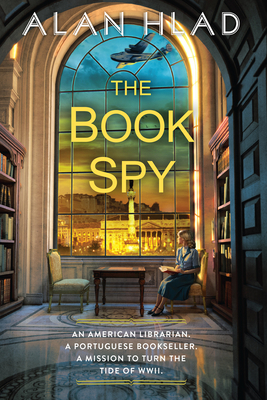THE BOOK SPY - Alan Hlad
It is 1942 and Maria Alves is a microfilm expert currently working at the New York Public Library. She learns of a plan, put together by President Roosevelt, to send librarians and microfilm experts to Europe to search through public records for information that might prove useful to war effort. Eager to be a part of this, Maria finagles a way in to a meeting to offer her talents. Being a woman, she's initially discounted as one of these types of spies, but her temerity impresses the right people and she's offered a post in Portugal.
Maria also becomes acquainted with a powerful man, Swiss banker Lars Steiger, who is supporting the Nazi war efforts. Maria's superiors ask her to become a double agent, giving Lars false information for him to pass on. This works well, but it puts her bookselling friend in great danger when he is sent to prison for being a part of the resistance.
I found this book to be quite interesting - I must admit that this is an area of espionage that I had not heard about, but as presented here by author Alan Hlad, made a great deal of sense. There is a wealth of information to be found at libraries and book stores that many of us might not otherwise consider. From a historical aspect, this was really great.
From a story perspective, I found this a bit dull. I was never really drawn in to Maria's world. Everything was presented directly to us (telling, not showing) so we as readers were kept at arms length throughout. Because of this, the romance was simply something that happened - we had no feelings for those involved, so Maria's reactions later on, when Tiago is imprisoned, just doesn't matter.
Similarly, there's no real tension as Maria becomes a double agent, other than the general tension of knowing someone is doing something dangerous. It's a very passive feeling rather than something that impacts us directly.
Some of this is a product of dialog:
"Frederick Kilgour recruited me," Roy said. "He's from Harvard, but he's recently taken on the role as head of the IDC - it's an acronym for Interdepartmental Committee for the Acquisition of Foreign Publications."
Who talks this way? It's just info-dumping disguised as dialog. And at one point, Maria says:
"I admitted to deceiving the Astors in a last-ditch attempt to speak with him about joining the IDC. I thought I might be arrested, but Donovan was impressed with me gate-crashing the event and he told me to expect a call from Kilgour."
This is too much information for Maria to rely given that we had JUST read the account of what happened. We were there for it, why do we need to have her telling someone else about it? It's little moments like this that hold the book back.
Looking for a good book? The Book Spy by Alan Hlad is a fascinating WWII historical fiction book that suffers a bit in the story-telling, but the premise is worth reading about.
I received a digital copy of this book from the publisher, through Netgalley, in exchange for an honest review.
3 stars
* * * * * *
The Book Spy
author: Alan Hlad
publisher: Kensington
ISBN: 9781496738547
paperback, 384 pages

Comments
Post a Comment